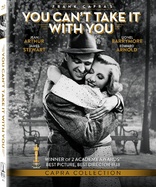You Can't Take It with You Blu-ray Movie
HomeYou Can't Take It with You Blu-ray Movie 
Blu-ray + UV Digital CopySony Pictures | 1938 | 126 min | Not rated | Dec 08, 2015
Movie rating
7.5 | / 10 |
Blu-ray rating
| Users | 0.0 | |
| Reviewer | 4.0 | |
| Overall | 4.0 |
Overview
You Can't Take It with You (1938)
A man from a family of rich snobs becomes engaged to a woman from a good-natured but decidedly eccentric family.
Starring: Jean Arthur, Lionel Barrymore, James Stewart, Edward Arnold, Mischa AuerDirector: Frank Capra
| Romance | Uncertain |
| Family | Uncertain |
| Comedy | Uncertain |
Specifications
Video
Video codec: MPEG-4 AVC
Video resolution: 1080p
Aspect ratio: 1.37:1
Original aspect ratio: 1.37:1
Audio
English: DTS-HD Master Audio 2.0 Mono (48kHz, 24-bit)
French: Dolby Digital 2.0 Mono
German: Dolby Digital 2.0 Mono
Italian: Dolby Digital 2.0 Mono
Spanish: Dolby Digital 2.0 Mono
Subtitles
English, French, German, Italian, Japanese, Portuguese, Spanish, Arabic, Czech, Danish, Dutch, Finnish, Greek, Hebrew, Hindi, Hungarian, Korean, Norwegian, Polish, Swedish, Turkish
Discs
50GB Blu-ray Disc
Single disc (1 BD)
UV digital copy
Playback
Region free
Review
Rating summary
| Movie | 4.0 | |
| Video | 3.5 | |
| Audio | 3.5 | |
| Extras | 2.5 | |
| Overall | 4.0 |
You Can't Take It with You Blu-ray Movie Review
Reviewed by Jeffrey Kauffman December 8, 2015There’s a moment during the second act of the original stage version of You Can’t Take It With You where chances are some in the audience will miss at least a few punchlines due to the fact that so many people are still laughing from the last punchline. The completely eccentric Vanderhof family has been introduced, and the uptight but very successful Kirby crew has entered the fray, completely discombobulated by what they’re experiencing. Add to the mix a Russian ballet master, a Federal tax inspector and a self absorbed actor, and a near perfect storm of farcical interactions is offered, one which authors George S. Kaufman and Moss Hart ply for almost unbelievable comedic riches. A lot of contemporary sitcom writers evidently write their scripts with a stopwatch, aiming for a laugh at prearranged intervals, but the marvel of Kaufman and Hart’s writing is how they manage to deliver huge laugh after huge laugh in a completely unobtrusive and wonderfully organic way. Long ago in a galaxy far away, I played the officious Mr. Kirby in a production of You Can’t Take it With You, with one of my best friends at the time playing Kolenkhov, that aforementioned Russian ballet expert, and I remember to this day sitting on the stage and trying not to make eye contact with my buddy, lest we both break out into giggles as wave after wave of audience laughter swept over us. One of the most interesting things about You Can’t Take It With You is how it rather subtly offers distinctions of class consciousness which were then rather at the forefront of American thinking due to the havoc wreaked by the Depression (the play first appeared in 1936) without ever coming close to seeming like a screed. The Vanderhofs are in essence the “unwashed masses”, well meaning folks who scrape by as best they can and who tend to have an artistic bent. The Kirbys on the other hand stand for the pinnacle of the American Dream, or as paradigms of (in contemporary parlance) the 1%. The clash of cultures is never overtly “economic,” and yet there’s a certain subtext at play that informs the interactions between the two families. What really drives the comedic impetus of the play, and to its cinematic adaptation as well, is the finely tuned ear Kaufman and Hart have for character. The writing duo brilliantly introduces each “type” and then simply lets the ensuing fracases play out as chaos seemingly takes over what is ostensibly a meet and greet between two groups which may soon be joined courtesy of a potential marriage between their children. Robert Riskin’s screenplay for Frank Capra’s 1938 filming of the play probably takes a few unnecessary liberties with Kaufman and Hart’s original formulation, but it wisely retains a large bulk of the play’s incredibly adept humor.
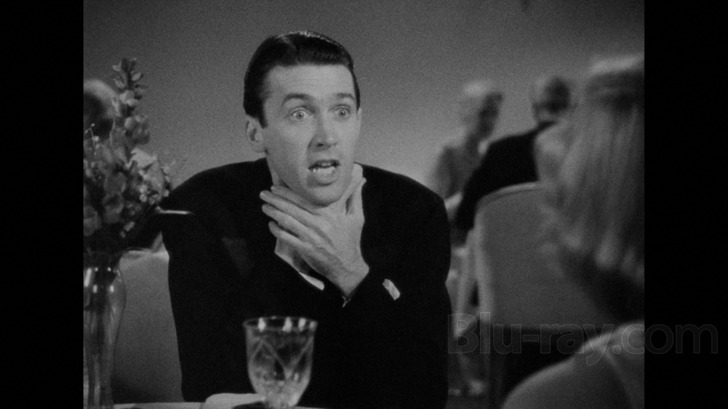
Perhaps because Hollywood didn’t quite have faith that they’d be playing to the same “sophisticates” that made up the New York City audience for the Broadway incarnation, the film version of You Can’t Take It With You begins in the button down world of the Kirbys rather than that of the more outrageous Vanderhofs, as banker Anthony P. Kirby (Edward Arnold) returns to the Big Apple from Washington, D.C., where he’s done a deal that will make him and his son Tony (James Stewarts) major “players”, even if it’s evident that Tony doesn’t really have much interest in power machinations. One of the unneeded elements added by Riskin for the film version has to do with Kirby needing the property on which the other family involved in the madcap tale, the Vanderhofs, reside. That too convenient piece of coincidence tends to chafe rather than play organically into the subplot of Tony romancing Alice Sycamore (Jean Arthur), a Vanderhof granddaughter.
Alice turns out to be something akin to Marilyn Munster of The Munsters fame, in that she’s the only reasonably “normal” person in her clan. Grandather Martin Vanderhof (Lionel Barrymore) is an ophiophiliac (i.e., a fan of snakes) who may have been neglecting to pay his federal income tax for quite some time. Grandpa’s daughter Penny Sycamore (Spring Byington, Academy Award nominated for this performance) is a free spirit who spends her time writing rather risque romance plays, while also ostensibly parenting Alice and Essie Sycamore Carmichael (Ann Miller), who has dreams of becoming a famous ballerina despite an obvious lack of dancing talent. Penny's husband (and the girls' father) Paul Sycamore (Samuel S. Hinds) has a fondness for things that go boom, a proclivity that leads to lots of loud sounds emanating from the family home's basement, where Paul works feverishly with assistant Mr. DePinna (Halliwell Hobbes). Essie's husband Ed (Dub Taylor) helps her with their fledgling candy business while also pursuing his hobby of playing the xylophone (Taylor evidently got this first film role of his long career because he could play this particular instrument).
Various other characters pass through this maelstrom, including ballet master Kolenkhov (Mischa Auer), tax investigator Wilbur G. Henderson (Charles Lane), and inventor Poppins (Donald Meek), but the crux of the story is simply the interplay between the straight and narrow Kirby family and the wild and wooly Vanderhof clan. Unsurprisingly, the two groups mix like oil and water, leading to some romantic complications between Tony and Alice (guess how it all works out, though).
Capra’s film manages to capture a lot of the sweet intent of the Kaufman and Hart original while perhaps frittering away minute amounts of the original’s frenetic tendencies and comedic momentum. While a few of the revisions seem unnecessary, Riskin at least preserves a wide array of the original’s very smart laugh lines, almost all of which spring from character and situation rather than context free silliness. The original play was feted with a Pulitzer Prize, and this film version went on to win Best Picture and Best Director in the 1938 Oscar sweepstakes.
You Can't Take It with You Blu-ray Movie, Video Quality 
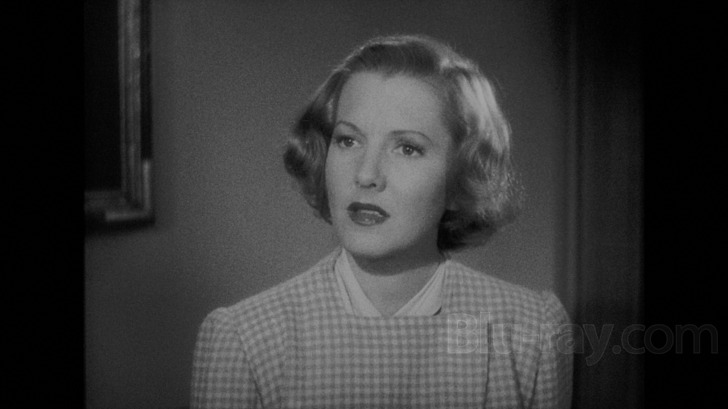
You Can't Take It With You is presented on Blu-ray courtesy of Sony-Columbia with an AVC encoded 1080p transfer in 1.37:1. The fact that this comes from the august team headed by Grover Crisp and is sourced from a new 4K restoration and scan may lead to some slightly outsized expectations of what this "should" look like, and so an understanding of some of the issues and obstacles faced by the typically reliable experts at Sony may help some to approach this from a more realistic perspective. Some interesting information from Post Magazine can be found here and which states in part:
Grover Crisp, Sony Pictures EVP asset management, film restoration & digital mastering, led the project and notes that preservation of this film had been problematic for decades. "The original picture negative is presumed to have been destroyed in the 1940s, and none of the surviving material is in good condition," he explains. "The best surviving element, a third generation nitrate duplicate negative, was the subject of preservation initiatives undertaken by the Library of Congress, with generous funding by David Packard in the 1980s."With that understanding in place, the look of this transfer is, while problematic, miles ahead of previous home video releases. While there are still minute fluctuations in density, contrast and gray scale, the overall look of the transfer is surprisingly homogeneous. Detail is still relatively middling, exacerbated somewhat by a rather coarse looking grain field. The transfer looks fairly dark quite a bit of the time, perhaps reflective of the dupe source elements. The restorative efforts have delivered elements that are largely free of any major cases of damage, and aside from some very minor wobbliness at some transition points (which I assume may be "joins" between the various sources), there are no other issues of image instability.
Through a bit of luck, Crisp was provided with additional source material for the new restoration. A 1939 print of the film (along with prints of several other films) was recently discovered on a ranch formerly owned by Capra, in Fallbrook, CA. Under the auspices Frank Capra, Jr., the prints were given to Sony Pictures for preservation and to assess their usefulness for future restoration of the titles.
"The 1939 print was made from the same dupe negative used in the 1980s restoration, but prior to the replacement sections being cut in," notes Crisp. "Even though both the dupe negative and the print were very soft, contrasty and full of built-in dirt, scratches and density fluctuations, we were able to mix and match shots from both to come up with the best image quality possible. The unfortunate state of these best remaining source elements is, of course, the reason for the relatively poor image quality of this film compared to most other major Capra titles."
You Can't Take It with You Blu-ray Movie, Audio Quality 
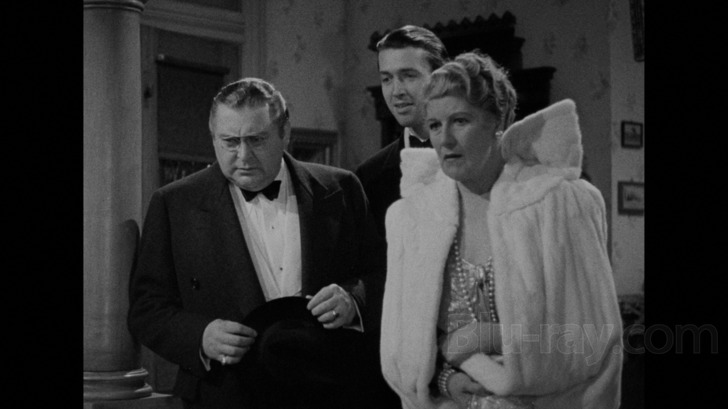
You Can't Take It With You features a lossless DTS-HD Master Audio 2.0 mono track which supports the film's rapid fire dialogue without much problem, but which reveals its source limitations when the infrequent musical interludes play. Then the narrowness and boxiness of the stems is most apparent, but never overly problematic. While obviously unable to overcome the technological limitations of the original recording, the track is decently clear, with good prioritization.
You Can't Take It with You Blu-ray Movie, Special Features and Extras 
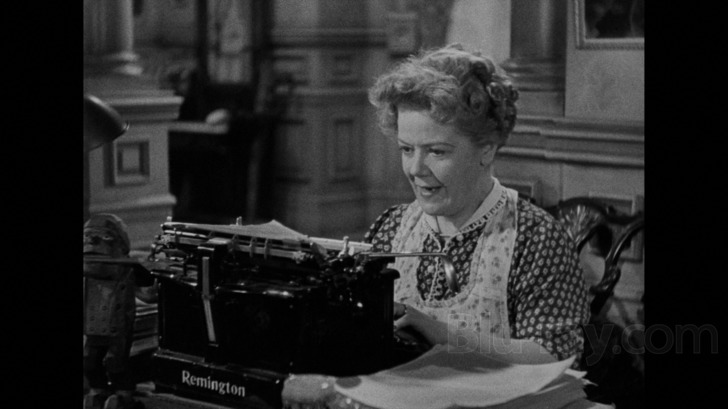
This Blu-ray release ports over the commentary and retrospective documentary that were included on the previously released DVD. This comes packaged in a handsome and nicely illustrated DigiBook.
- Commentary by Frank Capra, Jr. and Author Cathrine Kellison is an excellently informative but still quite naturally conversational commentary which covers a lot of information on things like cast biographies and even aspects like the production design.
- Frank Capra, Jr. Remembers You Can't Take It With You (480i; 25:42) is an appealing reminiscence by the son of the famed director.
- Theatrical Trailer (1080p; 1:01)
You Can't Take It with You Blu-ray Movie, Overall Score and Recommendation 
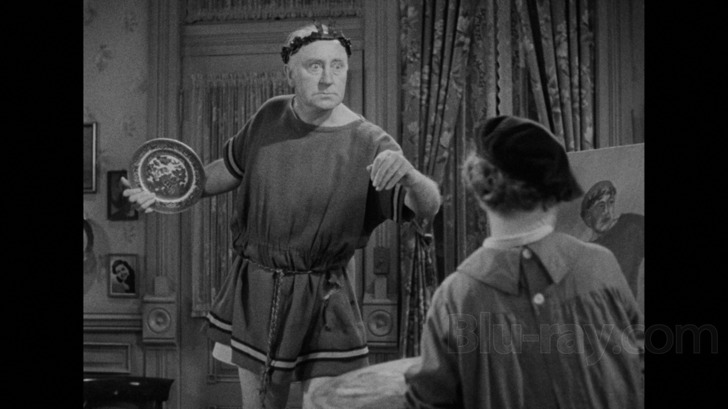
If you've never seen (let alone performed in) the original stage version of You Can't Take It With You, you'll be missing a bit of the original's forceful comedic impact, but the film iteration is still undeniably hilarious and really quite unexpectedly touching. Barrymore, who would play the evil rich guy in Capra's It's a Wonderful Life, gets to be the "good guy" proletariat here, while Edward Arnold essays the supposedly villainous patrician this time around. Stewart and Arthur are charming as the young lovers, but are not really the "stars" here in a traditional sense, as the film is stuffed to the gills with an ensemble that features a glut of colorful and often very funny performances. This new Blu-ray edition has done wonders with problematic video elements, but there are still issues that may potentially disappoint some ardent videophiles, though these issues are completely understandable given the state of the source elements utilized for the transfer. Given an understanding of the provenance of the sources, and with an appreciation for the largely fine adaptive work done by Capra and his team, You Can't Take It With You comes Highly recommended.
Other editions
You Can't Take It With You: Other Editions
Similar titles
Similar titles you might also like

Platinum Blonde 4K
1931

So This Is Love?
1928

The Miracle Woman
1931

It Happened One Night
1934

Ladies of Leisure
1930

Forbidden
1932

Mr. Deeds Goes to Town
80th Anniversary Edition
1936

Rain or Shine
1930

A Letter to Three Wives
Fox Studio Classics
1949

My Man Godfrey
1936

Cluny Brown
1946

Grand Hotel
1932

The Bitter Tea of General Yen
1933

The Palm Beach Story
1942

Bus Stop
Fox Studio Classics
1956

Sabrina 4K
1954

Why Be Good?
Warner Archive Collection
1929

Storm in a Teacup
The Vivien Leigh Anniversary Collection
1937

The Philadelphia Story
1940

Hollywood Ending
2002
